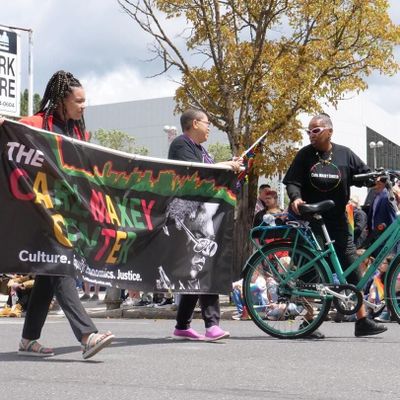Black Lens News
The Black Lens founder Sandy Williams was also an LGBTQ pioneer here in Spokane. She graduated from Washington State University in 1983 with a degree in psychology and was always passionate about social justice and community activism and gravitated to jobs that addressed issues like racism, sexism, classism, and discrimination.
After leaving Spokane to pursue a career in film, she moved back to Spokane to be closer to her parents. This led her to working a job with Suicide Prevention, working with teenagers to address mental health issues. That led her to become the Executive Director for Odyssey Youth Center, Spokane’s LGBTQ Youth Center. From there, she helped Eastern Washington University start their Pride Center and became the first coordinator.
Sandy didn’t stop there, starting The Black Lens newspaper and the Carl Maxey Center. Her investments in our community were always intentional and inclusive and we are proud to stand on her shoulders as we celebrate our queer black community this Pride season.
In Sandy’s words:
I was born a feminist, I believe. If it was possible to see me in my mother’s womb, you probably would have seen a fierce and determined embryo with my fist raised high in protest about some gender-based injustice that was being visited upon me in utero, even before I had any understanding of what it meant to be a woman.
I started at a young age fighting for equality. Challenging my junior high school when I was forced to take Home Economics instead of shop class because “girls needed to learn how to cook and sew for their husbands.” Challenging the pressure to use Miss or Mrs to identify myself, long before Ms was considered acceptable. Challenging the hospital that would not submit my daughter’s birth announcement to the newspaper because I was not married to her father and I “needed to get his permission first.”
Throughout my life I have proudly held up high the title of feminist, even as it seems to have lost popularity with much of the younger generation in recent years, and is used almost as a slur in some circles. I have worn the banner proudly, defining what a woman is supposed to be by how clearly she articulates her support for what I consider feminist principles. Women are strong and assertive. Women are leaders. Women are change makers and change agents. Women are powerful, intelligent and articulate. Women are the foundation and the bedrock upon which so many of the institutions that make up this country have been built. I am woman, hear me roar! Sure, there are women that do not fall into those categories, and in the spirit of inclusivity, I accept them and value them, but to be honest, for me, I felt that a REAL woman, a REAL feminist, had to encompass these categories… and more. And then I spent that past few months at my mother’s side as we cared for my father who passed away on February 7. My mother- a nurse and a military wife, spent her entire married life supporting my father. Moving when he moved. Living where he lived. Raising his children. Keeping his house. Dutifully cooking and cleaning and ironing and washing clothes. Never protesting for equal wages, never marching for equal rights, never challenging systems of patriarchy, or systemic and institutionalized oppression. Instead, my mother spent day after day and night after night dedicated and devoted to the man that she had lived with and loved for over half a century. I remember looking at my mom one night as she held my dad in her arms, cradling him and telling him to “let go and let God, if that was what he needed to do.” and I thought to myself, “Sandy Williams, you have absolutely no idea at all what real power is. Real strength. Real feminism.” It is that kind of power and that kind of strength, my mom’s kind, that has held back the forces that are determined to drive Black people into extinction. And because of women like my mother, feminists like me, are still here to fight another day.
